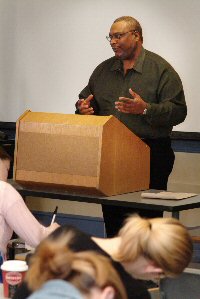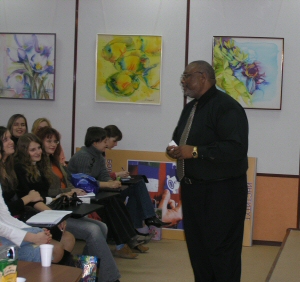The link to each individual course page will show the Syllabus, Assignment Schedule, Manual, Supplemental Material, office hours, TA's etc.
|
|
|
Spring 2013 The history of United States has been a paradox of triumph and tragedy as Americans over four centuries have continuously confronted each other over the meaning of democracy, justice and equality. Due to its ten week duration, this course cannot possibly present a detailed examination of the American historical experience. It will, however, identify and examine critical periods such as the revolutionary era, the 1830s, the Civil War and Reconstruction, the era of industrialization, World War II and the 1960s, when those themes have been challenged and tested. The challenges continue through this day. However we can take full advantage of our current vantage point to examine how this nation's past has prepared all of us in varied ways for our contemporary world. Is the battle for democracy, justice and equality over? Using a variety of historians and history sources, we shall try to answer that question during this quarter. Recommended Preparation |
Taylor Lecturing at the Ekaterinburg Institute of International Relations Ekaterinburg Russia September 2005 |
|
|
Winter 2017
African American history in the American West represents a particular challenge for historians. Most scholars who study the African American experience limit their focus to the Old South and the cities of the East and Midwest, only occasionally describing Los Angeles as an example of national trends in black history. Scholars of the American West usually focus on Native Americans, Latinos and Asian Americans if they discuss people of color at all in the region. Yet black history in the West is as old, complex, and compelling as Western or African American history. This course describes pre-1848 Spanish-speaking black settlers, slavery, post-civil war migration, buffalo soldiers, 19th and 20th Century black urban settlers, World War II migration, the civil rights movement in the West, the interaction of African Americans with other people of color. There will be particular focus on Seattle and Pacific Northwest. The course will present the diverse array of women and men who helped shape the history of the region, of black America, and of the entire nation.
Recommended Preparation
Survey courses in African American history, U.S. history, U.S. Western history.
|
|
Winter 2014
The History of African Americans has been a paradox of incredible triumph in the face of tremendous human tragedy. This course will present a detailed examination of the black experience in the United States from 1890 to the present to provide an understanding of the role African Americans have placed in the history of the American nation and an assessment of why they were, until the recent past, excluded from the promise of American democracy. We will analyze the various political, economic, social, and cultural strategies African Americans have employed to survive in an overwhelmingly hostile environment and assess their prospects as they make the final frontal assault of the structure of racially discriminatory institutions. Is the battle against racism and discrimination over? This course will attempt to answer that question.
Recommended Preparation
(Prerequisites, languages, recommended reading, etc.,)
HSTAA 321 recommended but not required.
|
|
Fall 2012
This undergraduate colloquium will critically examine six crucial debates in African American history since 1895. These debates have and continue to impact not just the African American community but the entire nation. In certain respects all of them are ongoing even if they are indentified with a specific period in African American history. Through these debates we will not only learn much about the major figures and questions of the time but hopefully we will also grapple with questions of race, justice, equality, and fairness that impact each of us as individuals and all of us as a nation.
Recommended Preparation
Survey courses in African American history, U.S. history.
|
|
Fall 2006
This colloquium will examine the four communities of color--African Americans, Asian Americans, Latinos and Native Americans--in the cities of the American West. The readings and discussions will analyze the growth of the specific communities of color in different urban settings, e.g., Chicanos in San Antonio, African Americans in Denver or Asian Americans in Seattle. It will also explore the interaction of these groups with each other, an interaction forged alternately in conflict, accommodation and cooperation. The colloquium will examine the myriad ways in which each group adjusted to urban life as well as the class and gender dynamics both within and between different groups. It will also discuss the differing strategies for ethnic "success" in the urban environment as well as the role of the city in fashioning individual and ethnic community identity.
Recommended Preparation
(Prerequisites, languages, recommended reading, etc.,)
History courses on Asian Americans, African Americans, Latinos and Native Americans, United States urban history, history of the American West.
|
|
Winter 2014
|
This seminar examines the growth and evolution of the African American urban communities from the colonial era to the present, with particular emphasis on the cities of the West. The seminar's goal is twofold: first, to introduce seminar participants to the historiography and methodology of black urban history; and second, to determine the manner in which the urban experience of African Americans shaped the contemporary world of black people and other urbanites in the United States. Additionally I hope the various histories discussed over the quarter, and our critical scrutiny of the texts, will encourage you to generate fresh perspectives and engage in creative approaches to the reconstruction of African American urban history. Although our knowledge of that history has risen dramatically in the past three decades, we still know woefully little about black urbanization in certain regions, most notably the West, and we have yet to learn much about the impact of gender and class on the shaping of contemporary black urban communities. We should use this seminar, and particularly the papers that will come from it, as the opportunity to expand our knowledge of those and other specific areas of the urban past. Recommended Preparation |
 |
|
|
Winter 2006
This field course will examine the growth and evolution of the African American urban west in the 20th Century. The seminar's goal is twofold: first, to introduce you to the historiography and methodology of black western urban history; and second, to determine the manner in which that experience shaped the contemporary world of African American and other westerners. In addition the various histories discussed over the quarter, and our critical scrutiny of the texts will encourage you to engage in fresh perspectives and creative approaches to the reconstruction of African American western urban history. Although our knowledge of that history has risen dramatically in the past two decades, we still know woefully little about black urbanization process in this region and we have yet to learn much about the impact of gender and class on the shaping of contemporary black urban communities. This seminar, and the papers that will come from it, present an opportunity to expand our knowledge of the various areas of the western urban past.
Recommended Preparation
Undergraduate survey courses in African American history and American urban history.
|
|
Winter / Spring 2005
This seminar allows research experiences and opportunities in African American History. It provides students with skills and methodology to pursue advanced research in the field. This seminar continues into the next term as HSTAA 553.
Recommended Preparation
(Prerequisites, languages, recommended reading, etc.,)
Students should have taken a number of graduate level history courses including other offerings in African American history.

